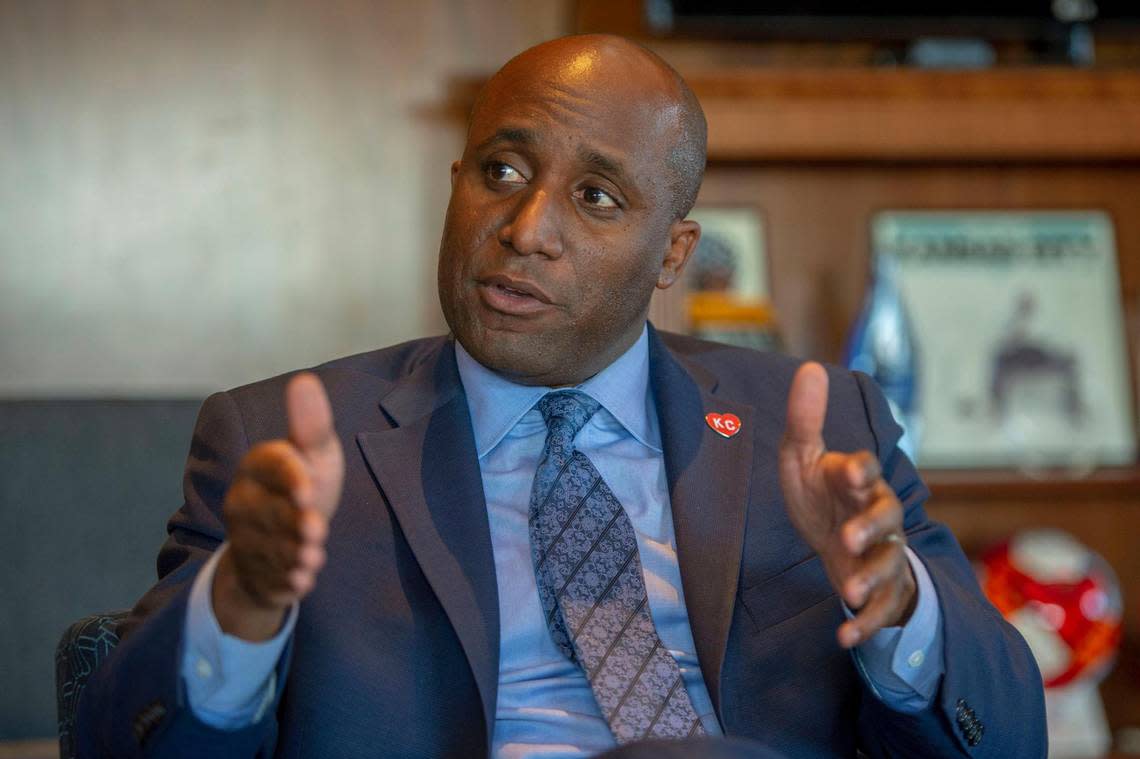Missouri votes to increase Kansas City police funding over objections from city, mayor
Missouri voters on Tuesday overwhelmingly supported an amendment to the state constitution that will require Kansas City to spend more money on its police force.
The measure mandates that Kansas City increase the allocation from its general revenue fund to the police department from 20% to 25%. With 87 percent of the vote in, about 63 percent of voters approved the measure.
Kansas City voters, however, rejected the measure.
Rep. Doug Richey, an Excelsior Springs Republican who supported the measure in the Missouri House, said the vast majority of voters in Missouri did not support efforts by Kansas City Mayor Quinton Lucas and the Kansas City Council to reallocate police funding.
“People are concerned about public safety. They’re concerned about crime rates,” Richey said. “At a time when crime numbers are looking the way that they are and when you attempt to pull $42 million out of a police budget, that is something the public is not going to be supportive of.”
Kansas City is already required by the state to spend 20% of its general revenue on the police department, and this year allocated 24.3%. City officials estimate that the spending difference between 25% and the current requirement of 20% is $38.7 million.
“Going into this election, we did not expect to win statewide because the ballot language was biased,” said Gwen Grant, president/CEO of the Urban League of Greater Kansas City, one of the groups that opposed the measure. “Our goal was to defeat Amendment 4 in Kansas City to make a statement that Kansas Citians believe local budget decisions should be made by our local elected officials.
“It is unfortunate that the Missouri legislature took such extraordinary measures to hijack our rights based on a false narrative that the City Council defunded the KCPD. The exact opposite is true. KCPD has consistently received funding over and above state mandated levels.”
Lucas already has said that he plans a legal challenge to the measure because it violates the state’s Hancock Amendment, which prohibits unfunded mandates.
While voters across the state cast ballots on the measure, it only impacts KCPD. Kansas City is the only municipality in Missouri that does not have control of its own police department.
KCPD is overseen by a five-member board of police commissioners that includes the mayor. The other four members are appointed by the governor. The city funds the police department but has no say in how that money is spent.
The state-control system has been in place for decades and had its origin during the Civil War.
The measure also pitted urban voters against suburban and rural voters. Those in Kansas City and St. Louis said it allowed mostly white voters to unfairly assert their authority over a more diverse community.
Several civic and civil rights groups, including the Greater Kansas City Chamber of Commerce, voiced their opposition to the amendment. The Chamber said that local budget decisions should be decided by local elected officials and not the Missouri General Assembly.
The Kansas City Fraternal Order of Police Lodge 99 endorsed the proposal and produced campaign fliers in support of the political effort.
The Missouri Constitution says that the state is not allowed to give mandates to cities without providing any funding to carry out those mandates. The amendment would make an exception for police funding.

Supporters of the measure said they wanted to ensure that KCPD had a stable and reliable funding source. The ballot question was a direct response to the 2021 effort by Lucas and a majority of the Kansas City Council to redirect $42 million from the police budget to establish a Community Services and Prevention Fund.
Backers of the measure said previous efforts by the Kansas City Council to reallocate police spending gave them few options.
The 2021 effort would have kept funding for KCPD at the state-required 20% threshold, while allowing the city to control a portion of the spending above that amount. The Kansas City Board of Police Commissioners sued and prevailed. A Jackson County judge ruled that the plan was illegal.
Earlier this year, the council voted to allocate $248.2 million, or 24.3% of its general revenues, to the police department. The total budget approved by the police board was $269 million.
Mark Tolbert, police board president, said that he and commissioners did not ask that the amendment appear on the ballot but would ensure the additional money is spent appropriately.
In an interview with The Star, Lucas called the amendment “one of the worst, most offensive ballot measures to have ever been placed on the Missouri ballot.”
